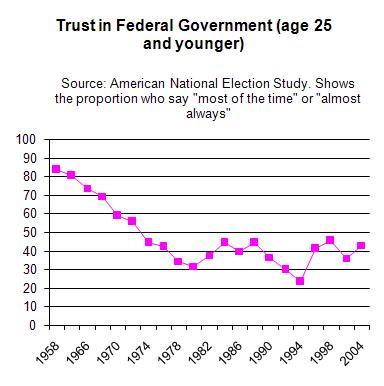« Hirsh on how to save the schools | Main | will the White House go all in? »
May 4, 2010
young people and trust in government
I was quoted on NPR's Morning Edition earlier this week, commenting on a new Pew survey that finds 32 percent of young adults trust the federal government. That's not exactly a resounding vote of confidence, but it's much higher than the level of trust observed in older people today. For instance, just one in five of the 65-and-older group trusts the feds. In my quotes, I attribute some of the difference to generational traits. We know from many other surveys--and from comparisons to surveys in past decades--that Americans born after 1985 tend to be more trusting toward government and other institutions (including corporations) than other recent generations were at the same age. They are also more likely to favor government action to promote equality and social welfare. See Peter Levine, Constance Flanagan, and Les Gallay, The Millennial Pendulum (pdf).
But three important caveats are in order. First, even though young people have more favorable views of big, adult-led institutions than their predecessors had since the 1960s, they continue to set records for lack of trust in fellow citizens. This is the "social trust" that is thought to promote all kinds of good outcomes, from democratic participation to health and well-being. It remains in deep decline.
Second, young people are surely still forming their opinions. They are not dyed in the wool. Pew finds that the whole population has some of the lowest levels of trust ever recorded in the government. Public anger comes on the heels of a deep recession and a series of bailouts. The research on Millennials' attitudes mostly predates the recession. By the time the dust settles, young people may conclude that the Obama Administration (which they played a major role in electing) helped them and the country, in which case their levels of confidence will rise. Or the Millennials may conclude that the feds fiddled while Rome burned, in which case their formative experiences will be sharply negative. The story is far from over, and it's way too early to make predictions about a whole generation (the youngest members of which are now turning five years old).
Third, we tend to compare Boomers, Xers, and Millennials with great interest, focusing on fairly small changes. That's because we have lots of comparable data on them. But if you take a longer view, it's clear that the big changes occurred four and five decades ago. At the height of the New Deal, the Fair Deal, and the New Frontier, vast majorities of Americans--young and old--trusted the federal government to do the right thing. After Watergate and Vietnam, trust has bounced up and down depending on the economy and other news, but it has remained in a whole new band. Where once trust was the norm, now distrust prevails. This change explains a great deal about the direction of national policy since 1970.
May 4, 2010 9:16 AM | category: none
Comments
nonePost a comment
Thanks for signing in, . Now you can comment. (sign out)
(If you haven't left a comment here before, you may need to be approved by the site owner before your comment will appear. Until then, it won't appear on the entry. Thanks for waiting.)